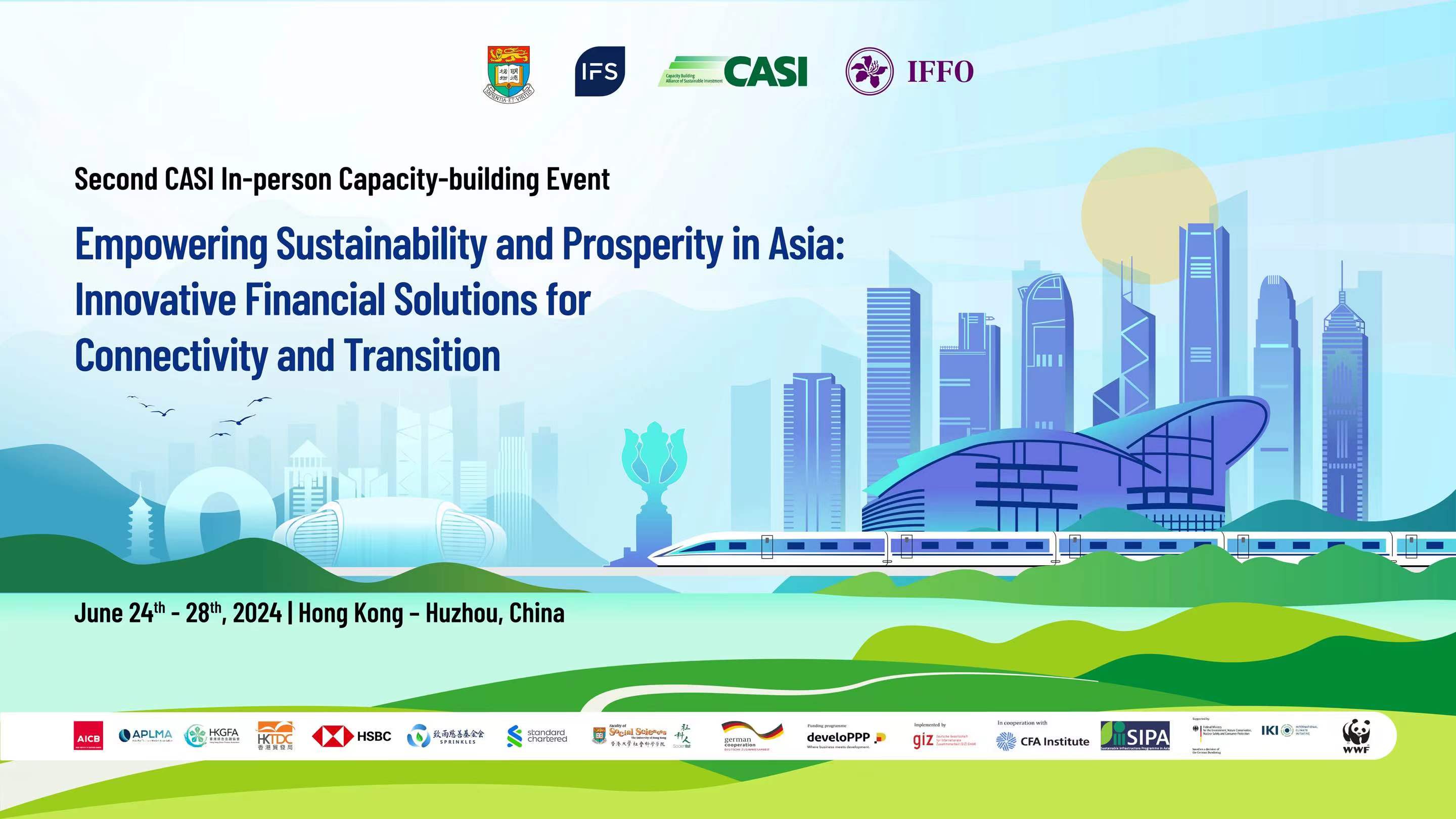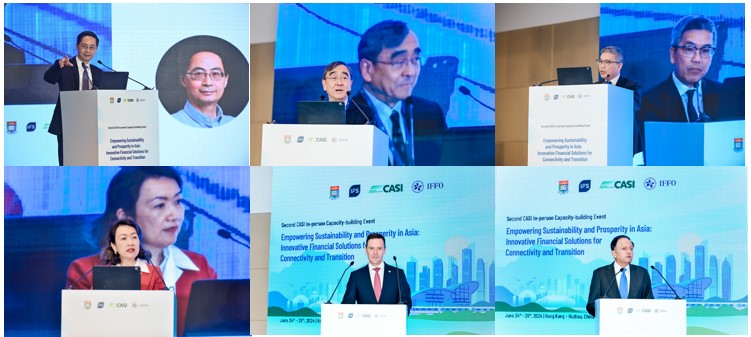
Hong Kong and Huzhou, June 29, 2024 – The Capacity-building Alliance of Sustainable Investment (CASI) has successfully concluded its second in-person capacity-building event, primarily tailored for countries and the region. Themed “Empowering Sustainability and Prosperity in Asia: Innovative Financial Solutions for Connectivity and Transition,” the event featured a two-day workshop in Hong Kong from June 24th to 25th, followed by a field trip to Huzhou in Zhejiang Province, one of China's leading green finance pilot cities, from June 26th to 28th via high-speed train.
Co-hosted by the Institute of Finance and Sustainability (IFS), Hong Kong Monetary Authority (HKMA) Infrastructure Finance Facilitation Office (IFFO), and the University of Hong Kong (HKU), the event provided a platform to share best practices and promote innovative sustainable finance solutions among emerging markets and developing economies (EMDEs) aiming to scale up their sustainable finance markets.

Over 300 participants from more than 20 jurisdictions attended the event in Hong Kong, representing central banks and regulators, executives from leading financial institutions, corporations, NGOs, research institutions and industrial associations. Influential thought leaders from across the Asia-Pacific Region, including Cambodia, Australia, mainland China, Hong Kong SAR, Indonesia, Japan, Kazakhstan, Kyrgyzstan, Macau SAR, Malaysia, Mongolia, New Zealand, Pakistan, Samoa, Singapore, Sri Lanka, and Thailand, as well as from developed non-Asian markets such as Europe, the UK, and the US, also participated. Attendees have expressed their high regard for the event's content and execution, with many hoping for CASI to extend its capacity-building services to other regions as well.
In Hong Kong, expert speakers shared the latest trends and practices through enriching dialogues on a wide range of topics, including sustainable finance frameworks, sustainability disclosure, green and low-carbon transitions, origination of sustainable projects, blended finance, biodiversity conservation, and blue finance. Participants actively contributed to the discussions and knowledge-sharing sessions, bringing in various use cases of sustainable finance taxonomies, potential solutions for challenges in sustainability disclosure by SMEs, the role and deployment of transition finance, and strategies for better mobilizing financial resources to support sustainable infrastructure, preserve biodiversity, and scale the blue economy.

Ma Jun, Chairman of CASI and President of the IFS, stated, "Developing countries face a substantial financing gap in addressing climate change and the sustainable development agenda, amounting to trillions of dollars annually. One of the key reasons for this gap is the lack of capacity to develop sustainable financial markets and organize green projects. As a platform for integrating and providing global knowledge on sustainable finance, CASI offers training programs such as in-person events, webinars, and online learning to help bridge the capacity gap in the Global South.”
Arthur Yuen, Deputy Chief Executive of the HKMA, said, "The enthusiastic attendance today shows the rising awareness and growing interest in sustainable finance across the region. Countries in Asia need innovative sustainable finance solutions more than ever to balance the need to decarbonize with the right to develop. The public sector has an indispensable role in creating a conducive environment for industry players to experiment, grow, and thrive."
Professor Richard Wong, Chair of Economics and Philip Wong Kennedy Wong Professor in Political Economy at HKU, commented, "The HKU is dedicated to nurturing the next generation of leaders in sustainable development. CASI's event is an invaluable opportunity to bridge academia with action, inspiring our students to take on the mantle of sustainable finance and address the talent gap in this critical field."
Following the workshop in Hong Kong, over 100 participants continued their journey to Huzhou City in Zhejiang Province via high-speed rail, to explore and understand the experience of Huzhou's development in green finance. As one of China's leading pilot cities for green finance, Huzhou has achieved an impressive 48% annual growth in green loans, which now constitute 33% of all loans in the city over the past seven years.
In Huzhou, more than 170 attendees were warmly welcomed by leaders from the municipal government, as well as experts from local green financial institutions. Participants engaged in in-depth discussions with local regulators and green finance experts about Huzhou's outstanding cases in the development of green finance, transition finance, and fintech, and visited a series of local green demonstration projects and green financial institutions.
The visiting delegates expressed that the successful experience of Huzhou provided them with tangible examples of how sustainable finance can lead and support the green and low-carbon transformation of the local economy, especially for small and medium-sized enterprises, which has inspired the enthusiasm and confidence of participants from various countries to promote innovative practices in their own countries. Some participants also indicated that upon returning to their home countries, they would share their learning experiences and invite CASI to bring specialized capacity-building sessions to their nations, offering customized capacity-building services tailored to the specific needs of their countries.
During the case-sharing session, Dr. Ma Jun, Chairman of CASI, summarized the successful experience of Huzhou in five aspects, including:
1. Formulating and implementing green finance and transition standards and detailed implementation rules that are in line with local realities.
2. Creating an efficient green project library and a platform for connecting with funding.
3. Providing a variety of green finance incentives.
4. Offering a rich array of innovative green financial products, including green loans, green bonds, and green insurance, among over a hundred types.
5. Establishing a public platform for ESG data and carbon accounting to reduce the costs of implementing green and transition finance, and to guard against "greenwashing" risks.
Dr. Ma added that the success of Huzhou's green finance pilot has benefited from the Huzhou government's strong commitment to green finance and its strong coordination capabilities, its strategic vision of using fiscal incentives to mobilize social capital to participate in green development, and a dedicated, efficient, and innovative professional team.

Paul Moody, Managing Director of Global Partnerships and Client Solutions at the CFA Institute, noted, "As a founding member of CASI, CFA Institute plays a key role in helping investment professionals and investors better understand how investments contribute to a sustainable future. Empowerment through education is crucial in combating climate change, and our commitment to CASI reflects the profound impact of capacity-building to support sustainable finance globally. This visionary initiative will provide practical, implementable, and accessible support to the developing world."
Zhang Zhengwei, Special Advisor to the ISSB Chair and Director of the ISSB Beijing Office, said “In May of this year, CASI officially became a global capacity-building partner of ISSB. We look forward to the continued active cooperation between the two parties in the field of capacity building, and jointly promote the process of sustainable information disclosure in China, Asia, and other emerging economies and developing countries.”
The event received support from organizations committed to advancing sustainable finance in the region, including Asian Institute of Chartered Bankers (AICB), Asia Pacific Loan Market Association (APLMA), CFA Institute, GIZ, Hong Kong Green Finance Association (HKGFA), Hong Kong Trade Development Council (HKTDC), HSBC, Sustainable Infrastructure Programme in Asia (SIPA) supported by Germany's International Climate Initiative (IKI), Social Science Faculty of the University of Hong Kong, Sprinkles Charity Foundation, Standard Chartered Bank, and the WWF Greening Financial Regulation Initiative, as well as Huzhou Green Finance and Sustainable Development Research Institute, and Huzhou Green Finance Development Center.
>>Click here for a replay of the live broadcast (for the Hong Kong leg)<<


